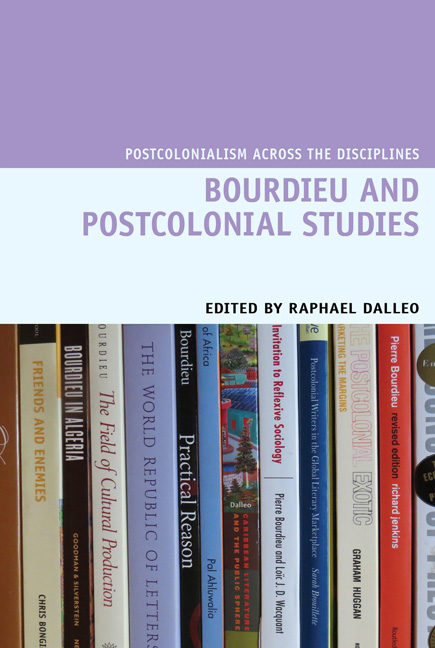Book contents
- Frontmatter
- Contents
- Permissions
- Introduction
- 1 Writing at the Margins: Postcolonialism, Exoticism and the Politics of Cultural Value (from The Postcolonial Exotic)
- 2 Exiles on Main Stream: Valuing the Popularity of Postcolonial Literature (from Friends and Enemies)
- 3 Postcolonial Authorship Revisited (from Postcolonial Writers in the Global Literary Marketplace)
- 4 Bourdieu and Fanon on Algeria
- 5 Style as Habitus: World Literature, Decolonization and Caribbean Voices
- 6 Playing the Game? The Publication of Oswald Mtshali
- 7 Fields in Formation: English Studies and National Literature in South Africa (with a Brazilian Comparison)
- 8 Archived Relationships: Pierre Bourdieu and Writers of the Caribbean Diaspora
- 9 Irony in the Dungeon: Anamnesis and Emancipation
- About the Contributors
- Index
6 - Playing the Game? The Publication of Oswald Mtshali
- Frontmatter
- Contents
- Permissions
- Introduction
- 1 Writing at the Margins: Postcolonialism, Exoticism and the Politics of Cultural Value (from The Postcolonial Exotic)
- 2 Exiles on Main Stream: Valuing the Popularity of Postcolonial Literature (from Friends and Enemies)
- 3 Postcolonial Authorship Revisited (from Postcolonial Writers in the Global Literary Marketplace)
- 4 Bourdieu and Fanon on Algeria
- 5 Style as Habitus: World Literature, Decolonization and Caribbean Voices
- 6 Playing the Game? The Publication of Oswald Mtshali
- 7 Fields in Formation: English Studies and National Literature in South Africa (with a Brazilian Comparison)
- 8 Archived Relationships: Pierre Bourdieu and Writers of the Caribbean Diaspora
- 9 Irony in the Dungeon: Anamnesis and Emancipation
- About the Contributors
- Index
Summary
Oswald Mbuyiseni Mtshali's transformation from township poet into a member of the international literati is a well-known story in South Africa: a rags-to-riches tale of his humble origins as dishwasher and messenger in Soweto, the publication of his best-selling collection Sounds of a Cowhide Drum in 1971, his successful international publication in New York and London, and his appearance at the Poetry International Festival in London alongside W.H. Auden and Allen Ginsberg. References to Mtshali's transition from obscurity to international poet feature as publicity devices in all the editions of this book: a sign of the literary publishing industry's reliance on the Romantic view of the creative author as a means of adding prestige and value to a literary work (Gardiner 2000). However, such ‘charismatic representation of the writer as “creator”’ is refuted by Pierre Bourdieu (1996, 191). He claims that, ‘it is this charismatic ideology, in effect, which directs the gaze towards the apparent producer—painter, composer, writer—and prevents us asking who has created this “creator” and the magic power of transubstantiation with which the “creator” is endowed’ (167).
This chapter considers how Bourdieu's sociology of culture can contribute to a new understanding of Mtshali's literary career. Examining Bourdieu's arguments about the publisher's role in creating the ‘creator’ and in producing the value of the work of literature, articulated in The Field of Cultural Production (1993) and The Rules of Art (1996), it charts the first three editions of Sounds of a Cowhide Drum, by Renoster in Johannesburg (1971), Oxford University Press in London (1972), and The Third Press in New York (1972). It then addresses the publication of Mtshali's second volume of poetry, Fireflames, by Shuter and Shooter (1980), and finally turns to the post-apartheid edition of Sounds in isiZulu and English by Jacana (2012). Based mainly on oral histories and new archival research, this is an investigation into how Mtshali's various publishers shaped his literary identity and positioned him in the international ‘literary field’ (Bourdieu 1993, 37).
Several postcolonial literary scholars have drawn on Bourdieu's field theory to inform an understanding of the structure of international publishing. They envisage a dominant global literary field, or marketplace, located in Europe and America, which imposes literary expectations on writers in the periphery.
- Type
- Chapter
- Information
- Bourdieu and Postcolonial Studies , pp. 137 - 158Publisher: Liverpool University PressPrint publication year: 2016

